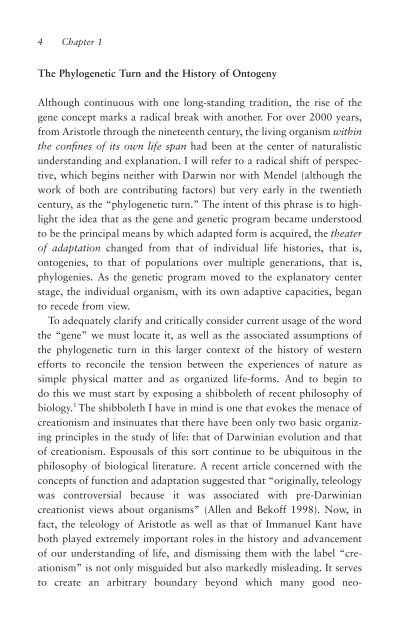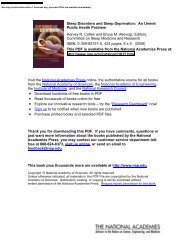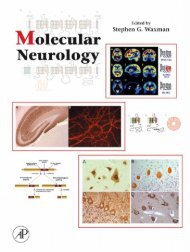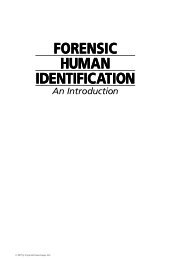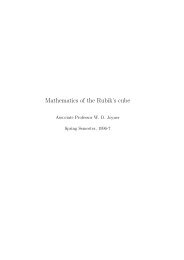A Critique of Pure (Genetic) Information
A Critique of Pure (Genetic) Information
A Critique of Pure (Genetic) Information
You also want an ePaper? Increase the reach of your titles
YUMPU automatically turns print PDFs into web optimized ePapers that Google loves.
4 Chapter 1<br />
The Phylogenetic Turn and the History <strong>of</strong> Ontogeny<br />
Although continuous with one long-standing tradition, the rise <strong>of</strong> the<br />
gene concept marks a radical break with another. For over 2000 years,<br />
from Aristotle through the nineteenth century, the living organism within<br />
the confines <strong>of</strong> its own life span had been at the center <strong>of</strong> naturalistic<br />
understanding and explanation. I will refer to a radical shift <strong>of</strong> perspective,<br />
which begins neither with Darwin nor with Mendel (although the<br />
work <strong>of</strong> both are contributing factors) but very early in the twentieth<br />
century, as the “phylogenetic turn.” The intent <strong>of</strong> this phrase is to highlight<br />
the idea that as the gene and genetic program became understood<br />
to be the principal means by which adapted form is acquired, the theater<br />
<strong>of</strong> adaptation changed from that <strong>of</strong> individual life histories, that is,<br />
ontogenies, to that <strong>of</strong> populations over multiple generations, that is,<br />
phylogenies. As the genetic program moved to the explanatory center<br />
stage, the individual organism, with its own adaptive capacities, began<br />
to recede from view.<br />
To adequately clarify and critically consider current usage <strong>of</strong> the word<br />
the “gene” we must locate it, as well as the associated assumptions <strong>of</strong><br />
the phylogenetic turn in this larger context <strong>of</strong> the history <strong>of</strong> western<br />
efforts to reconcile the tension between the experiences <strong>of</strong> nature as<br />
simple physical matter and as organized life-forms. And to begin to<br />
do this we must start by exposing a shibboleth <strong>of</strong> recent philosophy <strong>of</strong><br />
biology. 1 The shibboleth I have in mind is one that evokes the menace <strong>of</strong><br />
creationism and insinuates that there have been only two basic organizing<br />
principles in the study <strong>of</strong> life: that <strong>of</strong> Darwinian evolution and that<br />
<strong>of</strong> creationism. Espousals <strong>of</strong> this sort continue to be ubiquitous in the<br />
philosophy <strong>of</strong> biological literature. A recent article concerned with the<br />
concepts <strong>of</strong> function and adaptation suggested that “originally, teleology<br />
was controversial because it was associated with pre-Darwinian<br />
creationist views about organisms” (Allen and Bek<strong>of</strong>f 1998). Now, in<br />
fact, the teleology <strong>of</strong> Aristotle as well as that <strong>of</strong> Immanuel Kant have<br />
both played extremely important roles in the history and advancement<br />
<strong>of</strong> our understanding <strong>of</strong> life, and dismissing them with the label “creationism”<br />
is not only misguided but also markedly misleading. It serves<br />
to create an arbitrary boundary beyond which many good neo-


